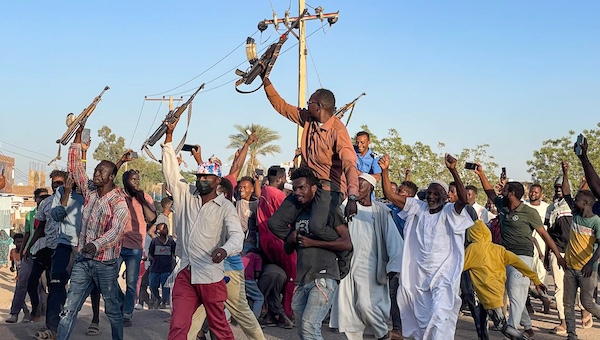
A GROUP IN WAD MADANI, IN SOUTH-EASTERN SUDAN, RALLY IN SUPPORT OF SUDAN'S ARMY IN DECEMBER, AS THE WAR WITH THE PARAMILITARY RAPID SUPPORT FORCES CONTINUES AND REFUGEES FLEE DARFUR IN WESTERN SUDAN. PHOTOGRAPH: AFP/GETTY IMAGES
‘THEY TOLD US – YOU ARE SLAVES’: SURVIVORS GIVE HARROWING TESTIMONY OF DARFUR’S YEAR OF HELL
BY: FRED HARTERORIGINAL SITE: THE GUARDIAN
With the war in Sudan poised to escalate and the humanitarian crisis growing, traumatised survivors of a blood-drenched summer in West Darfur tell of their ordeal
With the war in Sudan poised to escalate and the humanitarian crisis growing, traumatised survivors of a blood-drenched summer in West Darfur tell of their ordeal
G amar al-Deen was visiting a friend when gunmen poured into his neighbourhood on 27 April 2023. “I came back to find they were all dead,” he says. “My mother, my father, uncles, brothers, sisters. I wanted to die myself in that moment.”
Deen, a teacher, lost a dozen members of his family that day. Several of his neighbours were killed too.
The attack was one of many by the Rapid Support Forces (RSF), a paramilitary organisation, and allied Arab militiamen in El Geneina, capital of Sudan’s West Darfur region, between mid-April and mid-June. Their fighters carried out almost daily raids against areas of the city populated by the Masalit, an African ethnic group, according to former residents.
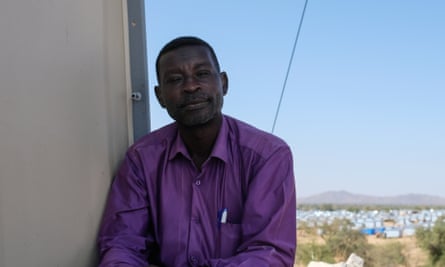
-
Gamar al-Deen, a teacher in El Geneina, the capital of West Darfur , lost a dozen family members on 27 April 2023 in an attack carried out by RSF paramilitaries
The attacks happened as the world’s attention was focused on fighting 700 miles away in the capital, Khartoum, as foreign governments launched frantic airlifts to evacuate their citizens . The scale of the tragedy unfolding in Darfur, a region ravaged by 20 years of genocidal violence, would only begin to emerge weeks later .
Sometimes the attacks were targeted, as the militiamen hunted down educated Masalits on kill lists. Mostly they were not. Masalit men and boys were accused of being fighters and summarily shot. Women and girls were killed. Women were raped near corpses.
There’s nobody in El Geneina. It’s ghostly quiet. It’s horrific to see areas once full of life now totally empty.
Aid worker:
Mahmoud Adam, a former interpreter with the African Union’s Darfur peacekeeping force, which left at the end of 2020 , lived close to an RSF base in the city. He said Arab militia would arrive most mornings on horses and motorbikes before heading out to launch attacks on Masalit neighbours.
“For two months, this was their routine,” says Adam. “I would hear them talking about the number of people they had killed at the end of each day.”
The attacks started on 24 April, according to residents, just over a week after nationwide fighting erupted between the Sudanese military and the RSF. They culminated in mid-June, after the killing of the governor of West Darfur , a Masalit, which prompted a panicked evacuation of El Geneina’s Masalit residents to neighbouring Chad and the outlying district of Ardamata, home to a large military base.
Thousands of fleeing civilians made easy pickings for RSF fighters and Arab militia, who fired at the crowds and at passing vehicles, according to survivors. One witness described “a scene from hell” with dozens of bodies along the roadside and washed up on the banks of a nearby river, some with their hands tied.
The hospital run by Médecins Sans Frontières in the Chadian town of Adré received more than 850 patients with bullet, stab and shrapnel wounds between 14 and 17 June.
Sexual violence was a feature of the bloodshed with gunmen rounding up and raping women and girls.
El Geneina once had a mixed population of more than half a million. Today, its Masalit neighbourhoods are deserted. “There’s nobody there, it’s ghostly quiet,” says an aid worker who visited recently. “It is horrific to see areas that used to be bustling, full of life, now totally empty.”

-
Destruction in El Geneina’s marketplace after fighting between the Sudanese army and the RSF on 29 April 2023
The cycle of violence would repeat itself in early November after the RSF captured the military base in Ardamata, a few miles from El Geneina. The garrison fell amid days of killings and looting . Last month, Alice Wairimu Nderitu, the UN’s genocide prevention adviser, warned that Darfur risked becoming a “forgotten crisis” .
H alf a million people now live in hastily assembled camps in Chad. Cash-strapped aid agencies are struggling to respond: the refugees do not have enough mosquito nets, blankets or water. About 175,000 are living in grass huts they weaved themselves.
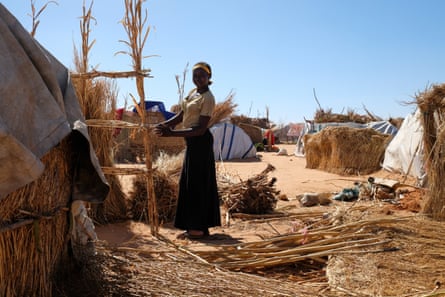
-
A Sudanese refugee builds a grass hut in the border town of Adré, eastern Chad, where about 175,000 displaced people live in similar makeshift huts
“Nearly every person who crossed the border has some sort of trauma,” says Eric Kwakya, a psychologist with the International Rescue Committee. “They have seen terrible things.”
Sherif al-Deen, a social worker, was drinking coffee in an El Geneina marketplace when RSF fighters and Arab militia first attacked on 24 April. He raced home, narrowly avoiding bullets ricocheting through the streets. He spent the next seven weeks volunteering at a clinic, collecting the wounded and dead from around the city with a team of volunteers. Bodies were wrapped in blankets and loaded on to donkey carts.
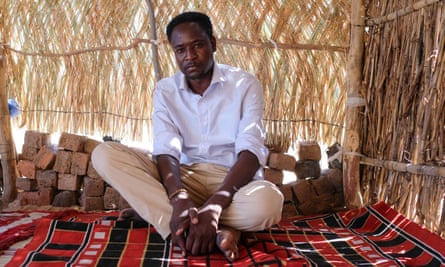
-
Sherif al-Deen, a social worker, risked his life to help collect the wounded and dead
Sherif saw a group of Arab fighters fire on a crowd with a machine gun, killing eight. Several of his colleagues were shot. “It was very dangerous work, but I had to do it for my people,” he says.
Burying the dead carried risks. To avoid being targeted by snipers, mourners held clandestine funerals for their loved ones at night, says Abdulmonim Adam, a lawyer and human rights monitor, who attended a dozen night burials between April and June.
At one funeral, the mourners came under fire and had to abandon the bodies beside half-dug graves. “If they see you burying the dead – if they see even the flash of a torch – they will kill you,” he says.
One of the deadliest attacks came on 12 and 13 May. At least 280 people were killed over those two days, according to the Sudan Doctors’ Trade Union .
We could hear gunfire for two months but our commanders told us it was a tribal conflict and not for us to intervene
Sara Mohamed* described gunmen looting her home on 12 May. During the attack, they shot her neighbour’s 10-year-old daughter. “I rushed to hold her, to stop the bleeding, but she died in my arms,” she says.
Another young girl was wounded, and a woman was shot through the stomach. When the militia returned a few hours later, they shot Mohamed’s father and burned down her home.
The massacre unfolded in stages over several weeks. Throughout the bloodshed, the Sudanese garrison at Ardamata’s military base did not venture beyond its blast walls. “We could hear gunfire for two months,” says one soldier. “But our commanders told us it was a tribal conflict, that it was not for us to intervene.”
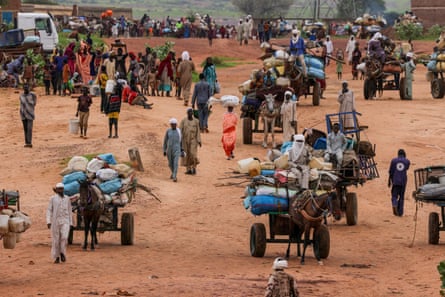
-
People trying to escape the violence in West Darfur cross the border into Adré, Chad, in August 2023
Mohamed and another woman interviewed by the Guardian were raped during the violence. Mohamed was gang-raped at knifepoint. The second woman was abducted off the street by a group of men, who covered her head and bundled her into a car. It was a targeted attack. “They called me by my name,” she says. “They said, ‘We know you are writing about the RSF on Facebook.’” Eventually she was driven back to El Geneina and dumped outside a clinic, hands still tied behind her back.

-
‘If they see you burying the dead they will kill you’: Abdulmonim Adam, a lawyer and human rights monitor who attended a dozen secret night-time burials
S ix months on, Sudan’s war is poised to escalate. Having captured most of Darfur, the RSF appears to be cementing its grip over Khartoum. This month, the paramilitaries took Wad Madani , the country’s second city, which had been hosting 500,000 refugees from Khartoum and serving as a logistics hub for aid agencies.
Close to 7 million people have been uprooted across Sudan, the world’s biggest displacement crisis. More than half the population need aid, and 3.5 million children under five are malnourished.
“A country of 46 million people is heading rapidly towards collapse, with very little attention from the outside world,” says Toby Harward, the UN’s deputy humanitarian coordinator for Sudan. “While acknowledging other crises elsewhere in the world right now, the scale of this crisis is unmatched, and it will have significant ramifications for the region and beyond.”

-
Sudanese refugees wait for UN World Food Programme food distribution in Adré
The international response to the crisis in Darfur has been “completely absent”, says Cameron Hudson, a former White House official. Hudson is critical of US-led attempts to mediate an “elite deal” between the RSF and the Sudanese military. “The US is worried the RSF won’t keep showing up if it holds them responsible for their atrocities and introduces sanctions,” he says. “They are holding the US government hostage.”
Meanwhile, among the Sudanese refugees camping in the desert in Chad, unease is growing. “Even here, I do not feel safe,” says Gamar al-Deen, the teacher.
* Name has been changed to protect identity
-
Information and support for anyone affected by rape or sexual abuse issues is available from the following organisations. In the UK, Rape Crisis offers support on 0808 500 2222 in England and Wales, 0808 801 0302 in Scotland , or 0800 0246 991 in Northern Ireland . In the US, Rainn offers support on 800-656-4673. In Australia, support is available at 1800Respect (1800 737 732). Other international helplines can be found at ibiblio.org/rcip/internl.html
AWFSM CATEGORIES
Activism | AI | Belief | Big Pharma | Conspiracy | Cult | Culture | Deep State | Economy | Education | Entertainment | Environment | Faith | Global | Government | Health | Hi Tech | Leadership | Politics | Prophecy | Science | Security | Social Climate | Universe | War
